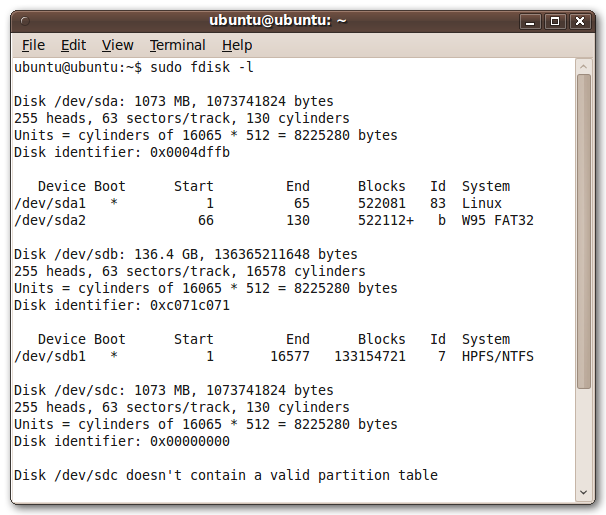Cloning a hard disk: Difference between revisions
Jump to navigation
Jump to search
mNo edit summary |
mNo edit summary |
||
| Line 9: | Line 9: | ||
== Unix dd == | == Unix dd == | ||
Unix ''dd'' has the functionality to clone one hard disk to another. To see what hard disk are available use the fdisk utility on linux. | |||
<pre> | |||
$ sudo fidsk -l | |||
</pre> | |||
The result will be something like: | |||
{| class="wikitableharm" width="950" | |||
|- style="vertical-align:top;" | |||
| width="400" | 2 Small hard disks, sda and sdb | |||
| width="550" | [[File:Ubuntu-fdisk.png|thumb}550px|center|Ubuntu fdisk -l]] | |||
|} | |||
| Line 18: | Line 29: | ||
<references/> | <references/> | ||
[[Category:Index]] | |||
[[Category:UNIX]] | [[Category:UNIX]] | ||
Revision as of 10:44, 4 March 2014
Cloning hard disk drives is a common maintenance task. Several options are available to perform clone options.
The most simple way is to boot Ubuntu from an USB-Drive and use native UNIX commands.
Ubuntu Live
The Ubuntu side has a complete tutorial how to create an Ubuntu Live USB on Windows [1] which is based on the USB installer provided at pendrivelinux.com [2][3] and a basic iso-Ubuntu distribution [4].
Unix dd
Unix dd has the functionality to clone one hard disk to another. To see what hard disk are available use the fdisk utility on linux.
$ sudo fidsk -l
The result will be something like:
| 2 Small hard disks, sda and sdb |  |
See also
Reference
- ↑ Ubuntu, Create an usb stick on Windows.
- ↑ pendrivelinux.com, Homewebsite
- ↑ pendrivelinux.com, Download universal usb-installer
- ↑ Ubuntu, Download Ubuntu Desktop,